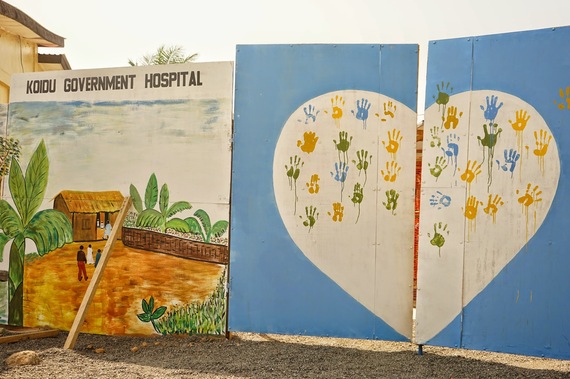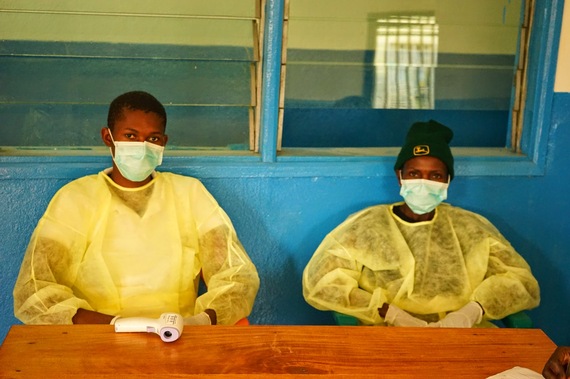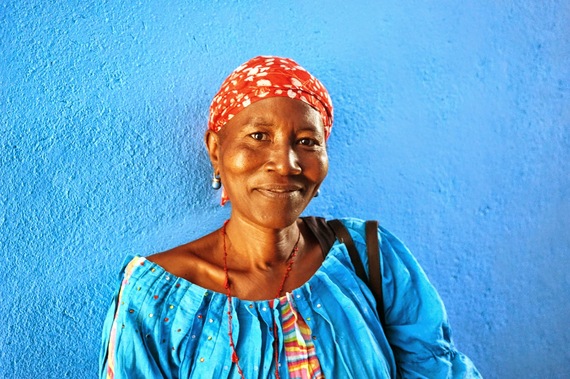
There has obviously been a lot of consequences here in Sierra Leone that have resulted from the Ebola outbreak--many bad, but some, potentially, could be used to make some positive change. Prior to coming here, I assumed things like personal protective equipment (PPE) -- like gloves, gowns, masks, and boots -- would now be a requirement for healthcare workers (it is) when before, they were a luxury. But there are other things I hadn't thought about.
1.Message Matters
People are afraid to come into hospitals. Hopefully this is temporary, but for now, there is a strong aversion to them. And it's a totally rational feeling based on what people have seen and heard over the past 10 months. They're starting now to study the messaging that was put out to the people when the outbreak was evolving. In fact, a Direct Relief partner here in Sierra Leone, the Medical Research Center, is doing a study with UMEA University in Sweden to analyze the messaging to advise future outbreaks. At the beginning of the outbreak, in order to convey the message that Ebola was very serious, the message was, "Ebola is deadly, it can't be cured, so use extreme caution and don't touch someone sick." While that message may have conveyed the seriousness, it also, unintentionally, discouraged people from going to the hospital since after all, it "can't be cured." Then that message changed to urge people to "call for an ambulance right away when you suspect Ebola and the suspect will be taken to the hospital for treatment." So then people started to feel that if Ebola patients were going to hospitals, that's where the Ebola was, so they tried to stay as far away as possible. Figuring out the messaging, and who best to give the message, will be critical for any future outbreaks here or anywhere else.
2.Ensure Trust in the Healthcare System
During the middle point of the outbreak, before the Ebola treatment units and the community care centers (now the first points care to triage every patient who needs medical attention) were built, all of the suspected and confirmed Ebola cases were sent to the hospitals. The Koidu Government Hospital in Kono that we visited this week at one time had dozens and dozens of patients languishing there.
Family members didn't know how they were doing because access was restricted, when people were taken out of the hospital they were often in body bags, and seven health workers died at the hospital. (This in a place where there are only four doctors in the entire district of 550,000 people). All anyone saw coming out of the hospitals was death. So it's taking a lot of work to convince people that the hospital is safe again to enter.
Therefore, most women haven't been delivering babies in a hospital, or even necessarily with a skilled birth attendant, at all for the past six months. It's expected that the incidence of maternal and infant mortality and cases of obstetric fistula will have gone way up because there was no care to be had for pregnant women ready to deliver. Malaria, TB, whooping cough, HIV--incidences of all of these are expected to have risen over the past year due to Ebola and the fear of hospital care. The only health condition that seems to have actually reduced during the time was cholera thanks to the diligent efforts to ensure proper hand washing.
On the flip side, clinical staff are taking extreme caution now as well. Some health workers in Liberia won't return to work until they see six months of PPE on hand at the facility.
And when dealing with patients with large amounts of bodily fluids, like delivering babies, many are requiring a negative Ebola test prior to care--although that can be hard to come by. We heard about a women who took an eight hour ambulance ride last week from Kono to Freetown over incredibly bumpy terrain to get a stomach fistula repaired after a botched C-section that was now leaking. Upon arrival in Freetown, she was told to wait the 21-day observation period to ensure she was Ebola free before the staff at the hospital would treat her.
3.Community Health Works
Wellbody Alliance, a group that's been providing fantastic clinical care in Kono District for many years, is now redoubling their efforts on community health. They've hired and trained 300 new community health workers in all of the 14 chiefdoms in the district to visit with the communities and meet people in hopes of referring those who need care to clinics.
Many of these communities are extremely remote and many people who are sick do not come for care for a variety of reasons. But a health worker who has the support of the chief and earns the trust of the community can make a huge difference. They are vital now for Ebola case tracking, but they are also trained to recognize the signs of HIV, TB, and malnutrition. In one day alone this month, their health workers were able to refer for treatment 27 patients who all tested HIV positive and another who had multi-drug resistant TB, the first person to be diagnosed in the region. We met many of these paid workers, most of whom were previously not employed, and we were struck by how proud they were of their work and their job, showing us the training manuals and spreadsheets they keep on their patient community. Hopefully, this is something that can be maintained as Ebola (and the Ebola-specific funding) gets starts to fade away. Because they've proven it works.
There are countless examples of how Ebola is going to change things in Sierra Leone--the surface hasn't even been scratched. It's likely that things will be talked about in terms of "before Ebola" and "after Ebola." The hope is that some positive change can actually result out of this terrible outbreak that's affected everybody in this country in one way or another.



